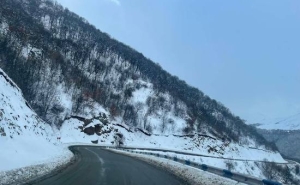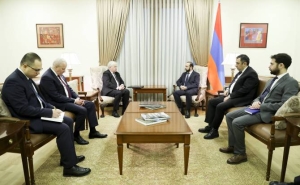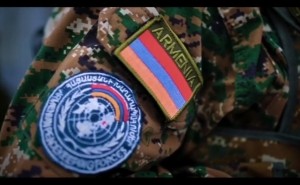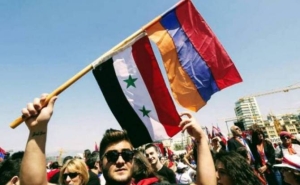 Armenia's Integration Processes in 2017
Armenia's Integration Processes in 2017
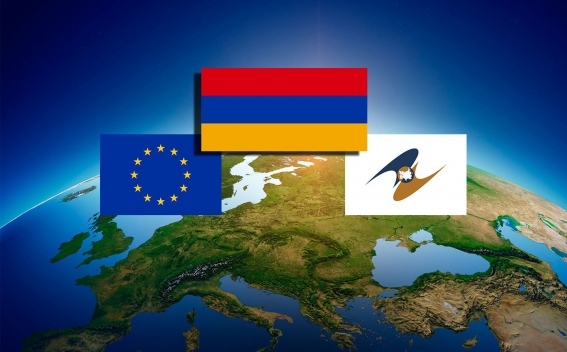
2017 was crucial and even decisive from the point of view of Armenia's integration processes. This year, by signing the Comprehensive and Enhanced Partnership Agreement with the EU, Armenia finally implemented its "both and" policy.
European direction:
In the context of European direction the year was marked by the end of the negotiations on the Armenia-EU agreement that took place on November 24 within the framework of the Eastern Partnership Summit in Brussels. This event is of great importance in terms of further development of political relations with EU and EU member states. The stereotype that Armenia has "turned away" from the EU and the process of European integration is finally broken.
It is also important that the Agreement has a rather extensive economic component, in which it addresses a wide range of economic issues, including the deepening of trade and further cooperation.
In the political context, it was also important to sign the Armenia-EU Partnership Priorities in 2017, which together with the Agreement, sets priorities for joint policy in the coming years. In this regard, EU Ambassador to Armenia Pyotr Svitalski noted that "Armenia is the only Eastern Partnership country that has signed the Partnership priorities. The latter is a very important document." Based on this document, negotiations on the Common Assistance Framework to be provided to Armenia by the EU and a detailed financial assistance document have been launched at the same period.
During the year, the issue of launching a dialogue on visa liberalization was not solved. The Armenian side has repeatedly stated on the highest level of readiness to start negotiations, but the process has not started yet. At the same time, in the final document of the Brussels summit, the EU hopes to "strengthen the cooperation and further advancement in the field of mobility in a safe and good governance environment and to reach a visa liberalization dialogue with Armenia for which a condition should be well-managed and safe mobility, Visa Facilitation and Readmission Agreements between the Parties ".
Also, the negotiations on the new aviation agreement between Armenia and the European Union have been completed, the agreement was signed on November 24 in Brussels. It is expected that the agreement will bring additional 87,000 passengers and over 16 million euros for the next 5 years.
During the year a number of educational, agricultural, anti-corruption, energy and other programs were implemented with the financial support of the EU. The Bavra border crossing modernization program, the ENPARD agricultural project, supporting the production of agricultural products in line with European standards in the villages, EU4Business and EU4Regions initiatives that promote SMEs in the regions and boost their capacities.
The EU also provided great support in the process of organizing parliamentary elections in Armenia in April.
Eurasian direction:
2017 has been a year of development of the Eurasian Union. During the year, retrospective work was carried out to form common markets, overcome the existing barriers and increase the internal mobility of goods.
Perhaps the most important achievement of the year is the coordination of the Customs Code for the EAEU, which will come into force from January 1 after the end of its ratification.
Another important achievement can be considered the coordination of digital agenda. During the summit in Yerevan on October 11, the leaders of the EAEU member countries approved the main directions of the implementation of the digital agenda. According to preliminary calculations, the implementation of the project by 2025 should ensure an annual GDP growth of about one million and about 8 million new jobs.
During the session of the intergovernmental council in Yerevan a "Roadmap" was also agreed in order to coordinate transport policy.
During the year negotiations continued on the formation of a unified energy market. The electricity market is generally agreed, and the issue of equal access to resources remains unresolved in the reconciliation of oil and gas markets.
2017 was also active in terms of the development of foreign relations of the Eurasian Union. On April 14, Moldova received the status of the EAEU observer country. On October 1, negotiations on trade and economic cooperation agreement between China and the EAEU have been completed. Negotiations with Egypt, Israel, India, Iran, Singapore and Serbia were continued on the establishment of a free trade zone or signing a trade and economic cooperation agreement. Mongolia also expressed intention to start a dialogue with the Union.
Referring to the economic data, according to the Armenian National Statistical Service, exports from the Republic of Armenia to the EAEU countries totaled 438 523.7 thousand USD in 2017, while it was 393 892.5 thousand USD in the previous year. And the imports totaled 1 023 016.8 thousand USD, compared to the 754 319.7 thousand USD of the previous year. All this indicates the growth of commodity turnover.
In addition, in 2017, the flow of tourists from the EAEU countries, particularly from Russia, has increased. Only in the first six months of the year the number of visitors with Russian passports exceeded the previous year by 33%.
Other materials on this subject
- EU Fully Supports Normalization Process of Armenia-Turkey Relations - Toivo Klaar "Normalization of relations and opening of communications is an important objective that the European Union fully supports", he said on Twitte
- The EU Wants To Be Engaged In South Caucasus The EU wants to be a very committed, active, and engaged partner for Armenia's stability, prosperity, and security. In this context, we had the opportunity to talk about Armenia-EU relations
- The 6th Meeting of the Armenia-EU Joint Visa Facilitation Committee Took Place The importance of the continuous mutual efforts aimed at promoting the mobility of citizens, fighting illegal migration and opening in due course the Visa Liberalization Dialogue has been underlined.
- Export From Armenia To The EU In 2019 Was 196.6 Million EUR Armenia has the highest percentage of the use of the preference among all the EU GSP+ beneficiaries in 2019, EU delegation in Armenia informs.
- Austria Completes Internal Procedures Necessary for Ratification of Armenia-EU CEPA Austria notified on July 22 the General Secretariat of the European Council and the Council of the EU about the completion of its internal procedures necessary for the ratification of the Armenia-EU Comprehensive...
Other materials on this subject
- EAEU to become one of key centers of Greater Eurasian Partnership, says Putin "Our integration may play the role of one of the key centers of the Greater Eurasian Partnership formation," the president added.
- Russia ratifies protocol on requirements for length of service of EEU bodies' employees for pensions The corresponding law was signed by Russian President Vladimir Putin. The document was published on the official Internet portal of legal information.
- We have reached significant achievements in the development process of the EAEU- Nikol Pashinyan A large single market has been created, the mutual trade figures have increased considerably.
- Russia ratifies agreement on simplification of payments for goods’ transit within EAEU territory The aforesaid agreement will be applied in the event that the goods are subject to the procedure of customs transit in one EEU member country, whereas customs and other payments in another.
- EAEU Countries Discuss Creating Eurasian Agency for Strategic Initiatives The issue has been discussed by the economy ministers of the Union’s member states and has been presented to the Eurasian Economic Commission in the platforms of the Eurasian Inter-governmental Council.
-
 17:08
17:08The regular session of the Anti-corruption Policy Council takes place in Jermuk
-
 15:05
15:05The Prime Minister sends congratulatory messages to the supreme leader of Iran and the President of Iran
-
 11:11
11:11Armenia sends earthquake aid to Turkey
-
 10:43
10:43Commemoration of the Pontiff St. Sahak Partev
-
 09:16
09:16Some roads are closed and difficult to pass in Armenia
-
 19:55
19:55Phone conversation of the Foreign Minister of Armenia with the U.S. Assistant Secretary of State for European and Eurasian Affairs
-
 18:30
18:30Prime Minister Pashinyan and President Khachaturyan meet
-
 18:20
18:20Ararat Mirzoyan with Co-Chairman of the OSCE Minsk Group of France Brice Roquefeuil
-
 17:01
17:01Humans could land on Mars within 10 years, Musk predicts
-
 16:45
16:45France, US urge 'immediate' end to Nagorno Karabakh blockade
-
 16:01
16:01Blockaded Nagorno Karabakh launches fundraiser to support quake-hit Syria
-
 15:59
15:59Earthquake death toll in Turkey rises to 18,342
-
 15:43
15:43Ararat Mirzoyan Held a Telephone Conversation with Sergey Lavrov
-
 15:06
15:06French president rules out fighter jet supplies to Ukraine in near future
-
 14:47
14:475 Day Weather Forecast in Armenia
-
 14:44
14:44President Vahagn Khachaturyan wrote a note in the book of condolences opened in the Embassy of Syria in Armenia
-
 14:20
14:20Azerbaijan’s provocations impede establishment of peace and stability – Armenian FM tells Russian Co-Chair of OSCE MG
-
 12:57
12:57France representation to OSCE: Paris calls on Azerbaijan to restore freedom of movement through Lachin corridor
-
 11:40
11:40Command of Kosovo forces highly appreciated preparation of Armenian peacekeepers
-
 10:16
10:16The United States withdrew from sanctions against Syria for six months the provision of assistance after the earthquake
day
week
month
Humidity: %
Wind: km/h


